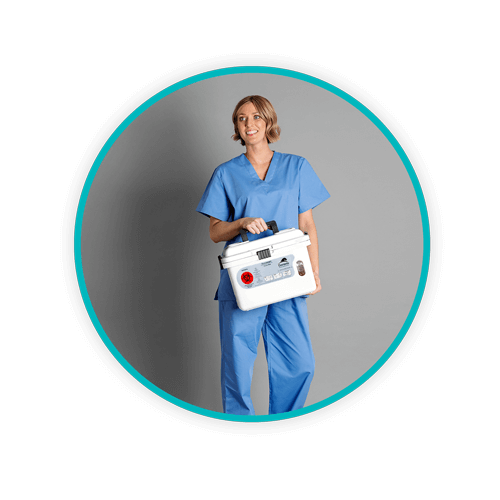Guide to Iowa Medical Waste Regulations

Daniels Health has been devoted to providing basic state guidelines for medical waste regulations over the past months. Why? Because we want you to know the law. We want you to understand the importance of taking the best (and legal) approach to healthcare waste management and medical waste disposal.
We also want to provide you with a starting point, a foundation if you will, on the laws that a number of federal and state authorities mandate that you need to follow to maintain compliance. Compliance is essential in avoiding fines and penalties for not taking care of medical waste properly.
What is “proper” medical waste management? It’s healthcare waste segregation, understanding the importance of waste segregation and identification of any medical waste stream produced by your healthcare facility. At times, it also means performing a waste audit so you can determine the types and volume of medical waste categories generated by your facility.
What’s that all got to do with Iowa’s medical waste regulations? More than you might think. Read on.
Who’s responsible for Iowa’s medical waste regulations?
In Iowa, the Iowa Department of Natural Resources overseas “special waste” and authorizations for disposal. However, like other states throughout the country, Iowa must also follow federal guidelines. Sometimes a state refers directly to federal laws and regulations regarding hazardous waste disposal, waste segregation procedures, and other healthcare waste management measures.
A number of resources to determine specific information in regard to how Iowa is mandated to regulate infectious waste can be found at the Healthcare Environmental Resource Center. This site focuses on compliance assistance for the healthcare industry as well as pollution prevention. Every state’s regulations are given a brief overview in regard to treatment of various types of waste, including hazardous waste (infectious waste) regulations.
Iowa defines infectious waste as something that can potentially be considered a ‘special waste’. Infectious waste in Iowa is managed by Iowa’s Solid Waste Department, and is identified as any type of waste that harbors a threat to the environment, to human health, or with characteristics or properties that make waste disposal and sanitary landfills difficult to manage.
In Iowa, infectious waste can include, but is not limited to:
- Blood and blood products
- Contaminated sharps
- Pathological wastes (human body parts or tissues that have been removed during an autopsy or surgical procedure)
- Any culture or stock from specimen cultures that have been collected from pathological or medical laboratories, as well as infectious agents that have been used in industrial or research laboratories. It also includes wastes that are the product of discarded live or attenuated vaccines, culture dishes, and biological agent waste byproducts.
Iowa’s Department of Natural Resources is the agency that approves special waste authorization. Its purpose is to ensure proper healthcare waste management, especially the type of medical waste (infectious waste) that has to potential to threaten human health or the environment.
Per their documentation, waste may be defined as “a special waste because of its quantity, concentration, or physical, chemical, or biological characteristics which may also require special handling, trained people, and/or special disposal methods.”
In addition, Iowa’s Waste Reduction Center and Pollution Prevention Services provide helpful with non-regulatory assistance for Iowa institutions in regard to applications, special waste authorizations, and state laws and rules for such.
Iowa’s Administrative Codes found under Chapter 109 – special waste authorizations – provide interesting reading in regard to its purpose, when and how special waste authorizations are required, and definitions.
Section 567-109.8(455B, 455D) defines special waste - general responsibilities. Among those, that special waste generators are responsible for ensuring that special waste arrives at the landfill in separate loads and is not combined or commingled with other wastes.
Section 567-109(455B, 445D) refers also to infectious waste, and states that “infectious waste which is generated and treated at a medical clinic, doctor’s office, nursing care facility, healthcare facility, dentist’s office or other similar facility may be placed with municipal waste and not handled in a special way if it is rendered non-pathological, does not contain free liquids, and sharps are shredded, blunted, granulated, incinerated, or mechanically destroyed…” and goes on to reiterate other specific instructions in regard to medical waste disposal.
Iowa regulations in regard to special waste authorization (SWA) applications mean that generators must include certain types of information such as:
- The physical form that the waste takes
- Weight and volume
- Chemical analysis of the waste
- A material safety data sheet (MSDS/SDS) for the waste or for materials from which waste is generated, if applicable.
- Toxicity characteristics that ensure that none of the federal limitations found in CFR title 40 Part 261 have been exceeded - and pay special attention to §261.11 criteria for listing hazardous waste.
Definitions in regard to laws and regulations are especially important. Clarification is key.
Daniels Health is experienced in “translating” regulations, wordiness, and definitions to ensure compliance. It is important to read the fine print. It is vital to take the time to understand the details. Failure to do so can result in massive fines that amount to tens of thousands of dollars per day for as long as the infraction occurs and is not rectified.
For healthcare facilities or any facility that generates medical waste in the state of Iowa, a couple of additional resources and statutory authorities for hazardous waste regulations and overall healthcare waste management are required reading. Those two include the Resource Conservation and Recovery Act (RCRA), and the Hazardous and Solid Waste Amendments (HSWA).
Medical waste generators in Iowa should also be aware that the state has not received authorization from the Environmental Protection Agency to operate its own hazardous waste program in lieu of the federal program.

Cover your bases with Daniels Health
Don’t leave compliance to chance. We are experts at healthcare waste management. Such management goes way beyond proper sharps container placement. It’s about taking the cradle-to-grave approach, which emphasizes not only moral and ethical responsibilities for healthcare waste disposal – it’s the law.
For more information on how Daniels Health can help your facility stay on top of ever-changing guidelines and regulations, contact us today. Alternatively find out more about our Indiana operations and service capabilities on our Iowa service page here.
